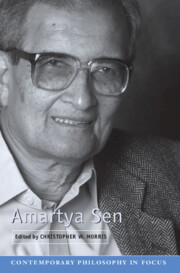Book contents
- Frontmatter
- Contents
- Contributors
- Preface
- Introduction
- 1 Preference, Choice, and Rationality
- 2 Ethics and Economics
- 3 Capability and Agency
- 4 Freedom in the Spirit of Sen
- 5 Social Choice Theory and the Informational Basis Approach
- 6 Sen on Sufficiency, Priority, and Equality
- 7 Famine, Poverty, and Property Rights
- 8 Development
- Selected Bibliography
- Index
- References
8 - Development
“A Misconceived Theory Can Kill”
Published online by Cambridge University Press: 05 June 2012
- Frontmatter
- Contents
- Contributors
- Preface
- Introduction
- 1 Preference, Choice, and Rationality
- 2 Ethics and Economics
- 3 Capability and Agency
- 4 Freedom in the Spirit of Sen
- 5 Social Choice Theory and the Informational Basis Approach
- 6 Sen on Sufficiency, Priority, and Equality
- 7 Famine, Poverty, and Property Rights
- 8 Development
- Selected Bibliography
- Index
- References
Summary
Human capabilities are partly created or undermined by development policies, markets, and other social arrangements. Put differently, human freedom is partly ‘human’-made. Sen's philosophical writings propose the expansion of human capabilities and freedoms as an objective for social arrangements, and argue that this objective satisfies certain considerations better than Rawlsian primary goods or utility measures. In approaching development, the chain of exploration can also be reversed. The policies, practices, analyses, and measures that guide development institutions can be scrutinized to uncover which truly aim at human freedoms, and how true their aim might be. Much of Sen's development writings engage or draw on investigations of this form. By such inspection, the oversights of development theories might be uncovered and corrected. Such work is terribly salient, for lives are at stake. In development, Sen observes, “a misconceived theory can kill” (Sen 1999a: 209).
Sen's writings on development include nine books, eight coauthored books, and more than 100 articles addressing economic development, poverty measurement, famines and hunger, gender inequalities, education, health, employment, population and the environment, written over more than forty years. His best-selling Development as Freedom (1999a) synthesizes previous work and provides an introduction to this approach. Sen has also presented his approach in overview articles, as have others (Sen 1980a, 1983a, 1984, 1985a, 1985b, 1987, 1988, 1989, 1990a; Crocker 1992, 1995; Qizilbash 1996; Alkire 2005; Clark 2005; Robeyns 2005).
Information
- Type
- Chapter
- Information
- Amartya Sen , pp. 191 - 220Publisher: Cambridge University PressPrint publication year: 2009
References
Accessibility standard: Unknown
Why this information is here
This section outlines the accessibility features of this content - including support for screen readers, full keyboard navigation and high-contrast display options. This may not be relevant for you.Accessibility Information
- 3
- Cited by
